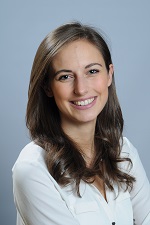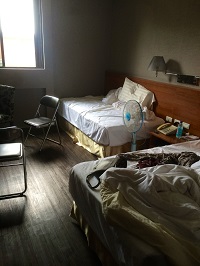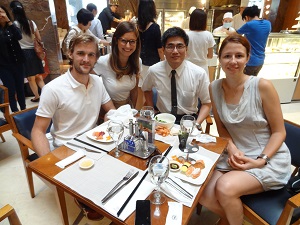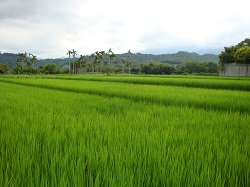By Anna Schütz.

Anna Schütz
As I am a person who is interested in getting to know different cultures and countries, in my 4th year of medical school I decided to do a clinical elective abroad. My university, the Medical University of Graz, has a very supportive exchange program, for which I applied. I was offered the opportunity to spend one month at Taiwan’s most renowned hospital – the National Taiwan University Hospital (NTU) together with two colleagues from Graz.
Mrs. Hallbauer-Huber from our university helped us in communicating with the NTU and our contact person I-Weng. I-Weng advised us ‘buddies’ – Taiwanese students who picked us up from the airport and helped us in finding our way through the hospital, which was not always that easy as everything is written in Chinese signs. We did not have to pay any fees for the clinical elective, as it was part of our university’s exchange program.

My room at the Alumni Hall, Anna Schütz
In terms of accommodation, the NTU recommended us to stay in the Alumni Hall. We thought it would be a good place to get in touch with some people, but basically it was a hotel. The huge advantage however was, that it was directly located on the hospital campus, which saved us a lot of time in the morning. Housing is very expensive in Taipei compared to other living costs. In our case we paid approximately 700€ for one month per person – but at that time the exchange rate was not in our favour either. Compared to other countries it is still quite fair. We spent far less money in Taiwan than in our home country. For an average meal you pay between 2 and 4 €. The flights are not too expensive either. In my case I paid 700 €, but had an excellent flight from Vienna to Taipei via Dubai with Emirates.
I spent the first two weeks at the anaesthesiology department. A colleague from Graz also did the same rotation. We were there together with 4 Taiwanese students. On our first day we got a supervisor who showed us the Clinical Skills Center (CSC) and trained with us there, for example how to intubate and how to put a central line. We got a time schedule and we were assigned to certain doctors, who worked in different fields. On one day, we were at the paediatrics department, the other day at the dental clinic, the following day at the pain clinic and so on. So we got a good insight into the working field of an anaesthesiologist. The doctors were very supportive and not only showed us some skills in the CSC, but also let us perform them on patients afterwards. If you are very into it, you can learn a lot there! They were not only very caring in the hospital, they also invited us to a typical Taiwanese dinner with all the other students and residents, and the chief of the department even made a day trip with his son and us to a nearby national park on a Saturday.
In the following two weeks, I did a clinical elective at the gynaecology department. One of my two program colleagues did the same rotation again. We got a supervisor as well, his name was Dr Cheng. He was very caring and supportive. For example, he asked us what we would like to do and I told him I would like to do a vaginal delivery on my own so he would call me as soon as he found one that was ideal for me to perform. He also took me with him to a caesarean section and let me deliver the baby, showed me how to perform an abortion and let me do it myself. He was a very good teacher and always tried to show us as much as possible.

With Dr. Cheng at the conference, Anna Schütz
One day there was a gynaecology congress going on in Taipei and Dr Cheng, of course, took us along with him to the conference. For us it was primarily good food and an impressive location as we did not understand much of the presentations and discussions in Chinese.
Besides Dr Cheng, the head of the gynaecology department was also a very good and prudent host. For example, on one day he took us to the national history museum of Taiwan and told us an awful lot about dinosaurs, which he loved.
Lost in Translation
Of course, there were a lot of misunderstandings due to language barriers and cultural differences on both sides. Most of the medical doctors could speak English properly, but with a strong accent, so we had some difficulties in understanding what they really meant. For example, if we got lost somewhere in the hospital, we could not ask someone for the way, because as we have experienced they would try to show us how to get there as courtesy, although they had no clue themselves. This made the situation sometimes even worse and we got really lost in translation.
The Taiwanese people are great hosts and take hosting very seriously. So, they made a lot of effort to make us feel comfortable and to see a lot of the country and their culture. I was often pleasantly surprised by the politeness and helpfulness of the people, because I have not experienced something like this anywhere else in the world. But sometimes it was also hard for us to understand their culture. For example, when the head of the anaesthesiology gave the Taiwanese dinner for us, we went to him to introduce ourselves and to thank him and so we shook his hand and he was acting strangely. Afterwards, a Taiwanese student told us that shaking hands in the Chinese culture is like kissing someone on the lips in our culture. We were very embarrassed.
Sometimes it was also hard for us to understand how long we should stay. Taiwanese people are very patient and have no problem waiting for hours although there is nothing to see or to do. We, on the contrary, understood these waiting periods as kind of an allowance to go home and enjoy the city – which we did.

Rice Fields, Anna Schütz
After our clinical elective, my two colleagues from the medical university of Graz and I did a 10 days roundtrip through Taiwan. We visited the most beautiful places. Everybody was so friendly and supportive. We did not go to places that were too crowded or touristy (except maybe Sun Moon Lake, which can be full of Chinese tourists) and we ate the most incredible food – so tasty, so healthy and always very cheap.
Altogether, I can only recommend doing a clinical elective at NTU in Taipei. To me it was a very instructive, interesting time. I did not only learn a lot in terms of medicine but also about cultural differences and how to adapt to a completely different environment. I would always do it again and had a great time there.
Interesting Websites
- Taiwan Tourism: an interesting website with useful information about trips to Taiwan
- Travel Taipei: a useful website that presents tips and insights on Taipei
- National Taiwan University Hospital: the hospital where I spent one month
- International Office Meduni Graz
Here you can download the experience report as PDF file.
If you are interested in working abroad as a medical student or doctor, click here for more information.
Published in GI-Mail 09/2017 (English edition). Sign up for GI-Mail here. 
Tip: More up to date educational events can be found online in the Education Database »medicine & health«.
